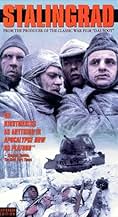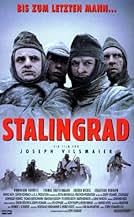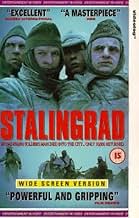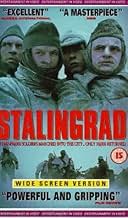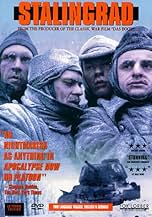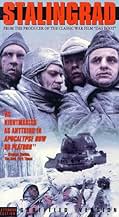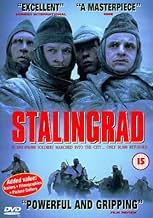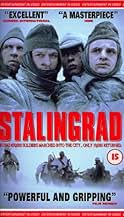La storia segue un gruppo di soldati tedeschi, dal loro riposo e recupero italiano nell'estate del 1942 alle steppe ghiacciate della Russia sovietica e termina con la battaglia di Stalingrad... Leggi tuttoLa storia segue un gruppo di soldati tedeschi, dal loro riposo e recupero italiano nell'estate del 1942 alle steppe ghiacciate della Russia sovietica e termina con la battaglia di Stalingrado.La storia segue un gruppo di soldati tedeschi, dal loro riposo e recupero italiano nell'estate del 1942 alle steppe ghiacciate della Russia sovietica e termina con la battaglia di Stalingrado.
- Regia
- Sceneggiatura
- Star
- Premi
- 3 vittorie e 1 candidatura in totale
- Pfarrer Renner
- (as Eckhardt A. Wachholz)
Recensioni in evidenza
These men are trapped like rats, and survival at any cost, to preserve ones life is paramount. Politics and lofty notions fly out the window, as the veneer of civilized behavior is stripped off.
STALINGRAD is gripping, grotesque, poignant and pitiful in its graphic presentation of war time experience. Highly recommended.
It isn't well understood, but the Eastern Front was used as a threat and as a punishment by Hitler. Even Schindler in the film Schindler's List used that threat on the train station in order to get his bookkeeper released from the death train.
There are two scenes that will haunt be for the rest of my life:
The scene where Lt. Hans von Witzland, played by a very young and splendid Thomas Kretschmann, and the Russian actress Dana Vavrova who plays Irina.
That scene is so emotionally charged that it left both actors physically shaking. I can't imagine having to repeat that scene more than once. To have to hold that raw, totally exposed feeling/expression and body language while lights are adjusted and a different angle is used must have been physically and mentally exhausting for these two brilliant actors. They perform a brutal Dance Macabre that is both horrific and fascinating.
This scene is no longer about an enemy and the one who has been conquered. It is about a young man desperate to find one moment of humanity on an endless nightmare and a young woman who hates him and herself and yet can not resolve her situation. That he is a German and she is Russian is not as important as that they are both souls in torment with no way out.
The human agony of that scene is superior to anything I have seen in over 60 years of watching movies.
The other is the final scene between Dominique Horwitz and Kretschmann as Fritz and Hans clinging to each other overwhelmed and miniaturized by the vast Russian winter.
That final scene reminds me of Napoleon's death march from Moscow in 1812. The results were to same. No enemy can come marching into Russia and live to march out again.
I began watching this film firmly committed to cheering the Russians and hating the Germans.
By the end I was crying for them all.
That is the message of this fine film. War is a waste...a waste of human lives, of property, and of moral and religious focus.
This is a classic anti-war film not unlike All Quiet on the Western Front or What Price Glory.
Moreover as far as the political side is concerned the film never surpasses the level of the 08/15 films by Paul May: it is simple in its division between the politically "good" and "bad" soldier, finding the latter in the higher ranks only, while the lower and lowest in rank are basically decent people; the soldier is just another victim of the regime. Compare this, if you have ever the opportunity, to what 6 German ex-soldiers tell about their experiences at the Russian front in the documentary "Mein Krieg" by Harriet Eder and Thomas Kufus (q.v.). I certainly do not want to suggest that Vilsmaier excuses the war (or worse), but he does not succeed in incorporating the socio-political situation, if he had ever the intention to do so..
There are surely impressive scenes (short truce in the plant; attack of Russian tanks, shooting of Russian civilians e.g.) and the battle scenes ar extremely well choreographed; the cinematography is sometimes stunning. But on the minus side: the cast is never more than average and the music is heavy handed.
In short: despite elementary shortcomings, certainly worth a view.
The combat scenes themselves are even more horrific. In one scene a German soldier hits a Russian over the head with a shovel as the Russian is trying to kill Ltn. von Witzland. In another scene a German soldier is cut in half by a Russian tank shell. There are many other gruesome scenes in the film, but they are necessary. The world has to see what happened in the Battle of Stalingrad. To see its brutality. To have its heart broken at the horrendous waste of the soldiers' lives. Over 2 million people lost there lives. Only 6000 of Field Marshal Paulus' 250,000-man 6th Army survived the battle. As with the battle, the film itself does not have a happy ending. And that's the way it should be. And as you watch this film, remember one thing, not every German soldier who fought in the war was a criminal. They were mostly decent people caught up in events well beyond their control.
Lo sapevi?
- QuizChristoph Fromm wrote the original screenplay. The producers disagreed with his more realistic direction. They had it rewritten, and Fromm took his name off the film.
- BlooperTowards the end of film a Ju52 drops a single supply parachute. When dropped out of the plane and falling towards ground, it is green, when they recover it on the ground it is white. (In reality the Luftwaffe was first using white parachutes until they realized it is too difficult to spot white parachutes on the snowy ground.)
- Citazioni
Lt. Hans von Witzland: The best thing about the cold is...
[Witzland dies]
Fritz Reiser: [holding the body, he laughs] You don't have to worry about sunburn. Ever been to the desert? You'd hate it. It's so hot, you're always sweating. You think you're melting, like butter. The desert is shit. Except for the stars. They're so close, you know?
[dies]
- ConnessioniFeatured in The 100 Greatest War Films (2005)
I più visti
Dettagli
Botteghino
- Budget
- 20.000.000 DEM (previsto)
- Lordo Stati Uniti e Canada
- 152.972 USD
- Fine settimana di apertura Stati Uniti e Canada
- 10.882 USD
- 29 mag 1995
- Lordo in tutto il mondo
- 152.972 USD
- Tempo di esecuzione2 ore 14 minuti
- Mix di suoni
- Proporzioni
- 1.85 : 1
Contribuisci a questa pagina


